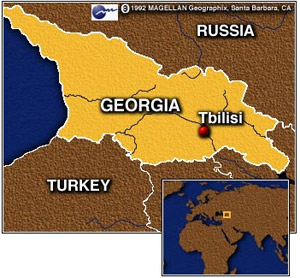Last week, Georgia and Russia were in tense relations. For starters, the Georgian parliament unanimously approved the decision of removing the Russian peacekeeping troops stationed in Abkhazia and South Osia which put their mission aside. Basically, the Georgian authorities took their first step towards removing the Russian “blue helmet soldiers” out of Georgia, or better yet, out of the conflict zone (the soldiers were threatened by the autonomous regions of Georgia since the first day they set foot there). In response to this, Russia decided not to participate in the intergovernmental and business conferences in Tbilisi, which had been planned months before. In addition, Russia did not even hide the reason for not participating; on the contrary; it connected that with the decision made by the parliament. Moscow looks at that as an intrigue which goes against the peace settlement of the conflict between the two autonomous republics and Georgia’s try to get its power back by force.
This decision made by Tbilisi had been in the process of being approved and serves as a final warning to the Russian peacekeepers. Georgia is certain that Russia is on the separatists’ side. It is proven by the Russian officials’ frequent visits made to Sukhum and Tskhinval, Sergey Bagapsh and Edward Kokoytay’s visits to Russia, where they are not greeted honorably but with prestige. Another proof is that almost all the government members of the autonomous republics are Russian citizens and that those countries are equipped with military equipment, however, they violate all the conditions set forward. That is why Tbilisi never takes into consideration the objections made by Moscow. Georgia lost its patience during the so-called Independence Day celebrations in Sukhum and Tskhinval. The celebrations went well in both republics with the participation of foreigners. The majority of them were Russian officials and one part consisted of the representatives of the former Soviet separatist republics. A parade of army soldiers marched at the celebration and Russian military equipment, which had not been registered by any international observer until the celebrations, could be seen.
Seeing the Russian military equipment at the celebrations was a good enough reason for Georgia to blame Russia for supplying Abkhazia and Southern Osia with illegal weapons and the Russian peacekeepers for helping Abkhazian and Southern Osian sides. After all, it is impossible to transport all those weapons without Russia’s scientific methods. The commands made by the “blue helmets” were denied, following the old tradition, but this time the Georgians were helpless. Of course, Georgia didn’t really have a chance of winning since it had bombed Tskhinval during the days of the celebrations. Although the Georgian authorities deny taking part in the event, the world considered the event as unique. The U.S. Secretary of State made an announcement and strictly criticized the role that Russian peacekeepers play and at the same time, “taught Georgia a lesson.” The Secretary of State encouraged Georgia to “immediately think about a way to peacefully solve the separatist conflicts in the region.” The same announcement declared that Washington may draw its attention to and play a major role in the Abkhazian and Southern Osia conflict. This announcement made by Georgia’s powerful partner, which was the first time, motivated the Georgian authorities to be more practical and remove the Russian forces out of Georgia once and for all. They didn’t care with what status they were there. In order for the “blue helmets” to leave, the legislative body can make the decision and the executive body can carry it out by removal. But this is all theoretical. The Defense Minister of the Russian Federation Sergey Ivanov made it just in time to announce that the Russian peacekeepers will be staying in the country no matter what. This means that even if the Russians leave Abkhazia and Southern Osia, they will not go silently. The question is not about the interests of Russians in Georgia, but rather, the fact that Russia accepts that the Georgians doubt the mission that they are carrying out and it will admit violating some rules in exchange of being one of the leading, elite countries in the world.
There is yet another “but”. What will happen to Abkhazia and Southern Osia if the Russian “blue helmets” come out of the conflict zone after being pressured by world society? The people of Tbilisi are already talking about substituting them with peacekeepers from other countries and as a matter of fact, many refer to Ukraine. However, the thing is that if one of the conflicting sides has officially agreed to remove the peacekeepers based on evidence, then both sides must come to terms with bringing new peacekeepers into the country. If we take into consideration the current situation, it is very hard to imagine that the authorities of the autonomous republics will agree to substitute the Ukrainian peacekeepers with the Russians, or one of the peacekeepers of the NATO countries. After all, Georgia has close ties with Ukraine. Even more, all negotiations with Georgia are considered to be in the past.

